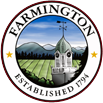About Farmington
Located at the crossroads of Routes 2, 4, 27, and 43, the picturesque Town of Farmington is Maine’s foremost four-season destination and gateway to the western mountains. Farmington offers numerous recreational opportunities and programs, along with many parks. There are over 10 miles of trails within walking distance of the downtown, and the eight “Walk Around Farmington” kiosk signs provide a self-guided history tour.
Farmington’s diverse community attracts artisans and writers, outdoor adventurers, professionals, wildlife watchers, foliage lovers and history buffs alike. This small-town lifestyle also offers a variety of shops and unique eateries, as well as community events and a long list of cultural amenities: book readings, concerts, art shows, plays, and a seven-screen movie theater.
The town has a population of 7,592 and approximately 331,000 people live within a 40 mile radius, with an average of 20,000 vehicles traveling along the Wilton Road daily. Farmington is the shiretown and government center for Franklin County.
In 1991, Farmington and Lac-Megantic, Quebec became Sister Cities with a written proclamation encouraging “educational, cultural, and economic growth”. An historical marker noting this relationship is on display in Meetinghouse Park. Click here to visit the Lac-Megantic website. Farmington, along with other area towns, demonstrated this commitment to Lac-Megantic on July 6, 2013 by sending fire fighters and equipment in response to a terrible train crash and explosion. Farmington’s Board of Selectmen set up a relief fund to help its Sister City in its rebuilding efforts. Click here to read a letter of thanks from Lac-Megantic officials. (PDF).
History of Farmington
In the late 1700s Stephen Titcomb and other early settlers chose the Farmington area to establish a community because of the geographic location, forests and wildlife, and the rich soil of the interval land along the Sandy River. Farmington was incorporated in 1794 and includes Farmington Falls, West Farmington, and the Fairbanks area.
Many of Farmington’s early settlers were well educated and cultured so insuring their children received an education was essential, and these values haven’t changed over the years. This is evident in the quality of education within the pre-K through 12 public school system, in the recent construction of the new elementary school and high school, and in the ongoing expansion and improvements for higher education opportunities offered at the University of Maine at Farmington.
Farmington is a vibrant area that has balanced the demands for beneficial growth, with its historical ambiance, while maintaining the high quality of life which makes it so inviting for families and an ideal location to establish a business.

